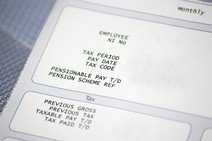Budgeting Money By Paycheck
Why is budgeting money by paycheck something that's rarely used?
Because when the personal budgeting process is usually taught or discussed, it's based on a calendar month, or four-week period.
Most pay periods are weekly or bi-weekly, not monthly, so doesn't it makes more sense to plan your spending by paycheck, instead of an arbitrary 30-day period?
(Just an aside here...most of us are taught to make a personal budget that results in a monthly surplus, instead of using zero-based budgeting, which is a much better way to approach making a home budget. If you aren't familiar with zero-based budgeting, you can read all about it here, then return to this page when done.)
Where does your paycheck go?
I can hear you now: "I don't know! That's why I need a household budget!"

Exactly. And if your income focus is based on your paycheck, then doesn't it make sense your expenses should focus on your paycheck, too?
Since most people have their household budget set up on a monthly basis, they usually compare total monthly income to total monthly expenses. Then they adjust up or down until the "bottom line" results in a surplus.
This seems to make sense, since a lot of bills come due every 30 days.
But if you really think about it, you aren't paid just once a month, are you? (Most people aren't.)
You don't go grocery shopping once a month, right? You don't buy gas, run errands or give your kids lunch money just once a month, either.
There are annual expenses like homeowner's insurance, Christmas, vacation, gifts and taxes, while some payments must be made semi-annual and even quarterly.
And lest we forget, there are always those fun unexpected expenses, too, like car repairs, home maintenance, landscaping, gifts and "Mom, I need a new pair of cleats".
Let's be real. There are plenty of expenses you incur that don't fit into a neat monthly package.
Many of those expenses are regular and fixed (like your cable bill), but most are irregular and somewhat to wildly variable (groceries, gas, clothing, gifts, car maintenance, and so on).
Why Budgeting Money By Paycheck Works Best
Paycheck budgeting works better than traditional methods of budgeting money because you match all your expenses--fixed and variable, known amounts and estimates--against your income.
You instantly know whether you earn enough in a year to cover all your fixed and estimated expenses. You're also able to regularly set aside money from one paycheck in order to cover expenses that will occur later (sometimes much later).
Ever bought something extra with "leftover" money, only to find out you really needed that cash later on, to pay a bill you forgot about? That "extra" money wasn't really extra at all.
Budgeting money by paycheck does a much better job projecting, managing and evening out your personal cash flow, which will make it easier for you to budget and plan ahead. You'll always know exactly how much you truly have to spend in between pay periods.

In addition, because your expenses will be broken down into regular, uniform amounts, it'll be incredibly simple and easy for you to create automated personal budgeting systems that speed up and simplify the process of saving and bill-paying. No more missing payments, late fees, or hassles!
Personal financial planning will be a lot easier and less complicated, because you'll be able to quickly figure the impact of taking on new debt, increasing expenses due to life changes, or setting new long-term savings goals.
All you have to do is divide the annual cost of the new expense by pay period and compare it to your current paycheck budget. Do you have enough surplus in each pay period to cover the extra expense? What are you willing or able to give up in order to make that expense fit?
You can easily run different income scenarios, whether your income goes up or down.
Tweaking your budget will be as simple as changing dollars or percentages for expense categories and learning right away how your paycheck budget will be affected. You'll be able to make financial decisions with confidence.
How Budgeting Money By Paycheck Works
You basically have two goals when budgeting by paycheck: allocate every expense to a paycheck, and keep cash flow "even" payday by payday.
All you have to do is divide expenses by the number of pay periods you'll receive until the next bill is due. Then, each pay period, set that portion aside until you've accumulated enough to pay the entire bill.
See An Example
For an in-depth example and advice on how to physically manage your funds when budgeting money by paycheck, click here.
Irregular and estimated expenses (like semi-annual or annual premiums, car and home repairs, or taxes) can be estimated based on prior years' totals. That way, they're never forgotten.
Any saving or investing you do after you get paid would be considered an "expense", in that you're "spending" part of your income on those categories. (Tax-deferred retirement contributions that come out of your paycheck don't count when you're figuring up your budget, since that money isn't available for you to spend or save elsewhere.)
If you enjoy a surplus after the initial budgeting process is done, then that surplus money can be re-allocated back to debt, saving, investing other expenses (this is a great time to boost those contributions to your tax-deferred retirement account).
If you discover a deficit during your budgeting process, then all you have to do is tweak your expense categories until you've brought your bottom line back to zero. (See our explanation of zero-based budgeting.)
Essentially, personal budgeting is really just the process of taking every future dollar you spend and allocating it to a future paycheck. That's paycheck budgeting in a nutshell!
Benefits of Budgeting Money By Paycheck
To summarize, what are the benefits of budgeting money by paycheck, versus traditional personal budgeting that simply compares monthly income and expenses?
You will:
- Experience even cash flow, not just "in" but "out" as well
- Always know how much discretionary cash you have to spend on paydays
- Never forget to account for non-monthly or unexpected expenses
- Easily set up automated savings and bill-paying systems
- Make more accurate financial planning decisions because you can see how actual cash flow is affected
- Quickly tweak your budget by changing expenses and seeing how paychecks are affected
- Feel as though you finally have control over the money you earn!
Budgeting Money By Paycheck page
to
How To Create A Budget That Works page
